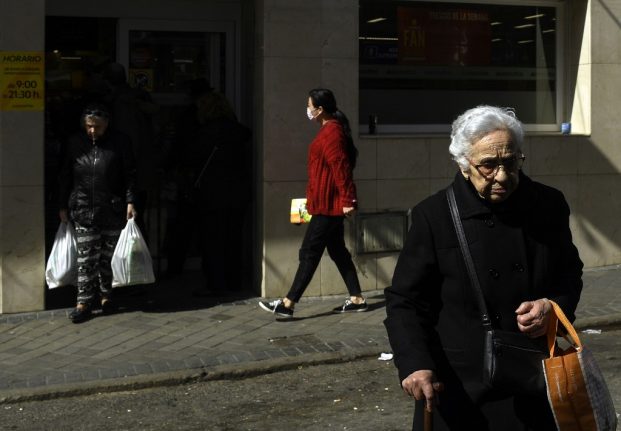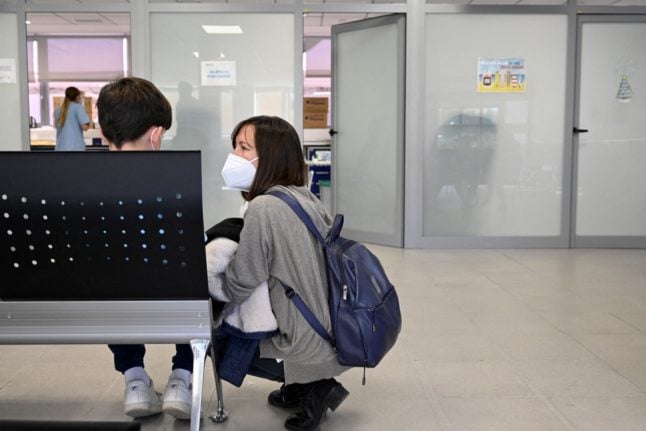On Tuesday, Spain unveiled drastic new measures to attempt to contain the coronavirus after the number of cases more than doubled within 24 hours.
LATEST: Valencia cancels Las Fallas fiesta amid coronavirus fears
The number of cases recorded in Spain has surged since the weekend with more than 1,600 individuals testing positive across Spain.
At least 100 cases are considered “serious” and are being treated in intensive care units and 35 people have already died from the disease.
While authorities in Madrid, the Basque Country and La Rioja took decisions to close schools, colleges and universities as well as day care centres for the young and elderly, the government took the decision to suspend flights between Spain and Italy and to cancel sporting events where large crowds were expected.
Up until now, authorities had insisted that closing the schools and keeping children at home could be counterproductive.
READ ALSO:
- Canary Islands: Lockdown ends in Tenerife hotel over coronavirus
- Spain suspends all flights from Italy over coronavirus
- Coronavirus in Spain: What's the latest and what do you need to know?

Schools in Madrid will be closed from Wednesday. Photo: AFP
Fernando Simón, the director of the Health Ministry’s Coordination Center for Health Emergencies, who leads the twice daily press conferences has argued that closing schools could see children placed in the care of older grandparents who represent the most vulnerable group when it comes to the coronavirus.
However, Health Minister Salvador Illa said the time had come to order the closures.
“The measures that we have adopted in the educational area seem effective to us to avoid transmission and contagion, in line with those taken by our European counterparts,” Illa said.
The government also ordered the cancellation of events likely to draw crowds over 1,000 people in the hotspot areas of Madrid, Vitoria and Labastida, just 48 hours after the capital saw huge congregations gather on the streets to march for Women’s Day.
Numerous sporting events have been either cancelled or will be played behind close doors during the next few weeks.
Spain's La Liga confirmed on Tuesday that first and second division football matches will be staged behind closed doors for at least two weeks due to the coronavirus outbreak.
The measures follow the decision of the Spanish High Council of Sports that all sporting events in Spain at state and international level should be played without fans to limit the spread of the virus.
“According to information from the High Sports Council (CSD), La Liga Santander and La Liga SmartBank matches will be played behind closed doors from today and for at least the next two weeks,” a La Liga statement read.
“La Liga will remain in permanent contact with the Ministry of Health and the CSD to meet their recommendations and/or decisions, and put first the health of fans, players, club employees and journalists during the health
crisis of COVID-19.”
Authorities have cancelled a programme of trips organised for the elderly under the Imserso programme (the institute for Elderly and Social Services)
Hoy el Consejo de Ministros ha decidido adoptar medidas para frenar la expansión del #Coronavirus y proteger a la población vulnerable en el marco del Programa de Turismo Social del @Imserso. #CMin.
(HILO)?pic.twitter.com/iBOZTZKrEa
— Vicepresidencia de Derechos Sociales y Agenda 2030 (@VSocialGob) March 10, 2020
“Travel must be avoided whenever possible,” explained Illa.
Flights between Italy and Spain have been suspended from midnight tonight until at least March 25.
Illa also recommended companies to insist on working from home (teletrabajo) where possible and to avoid meetings.
Elderly day care centres in the capital have been closed since last Friday and visitors at residential homes for the elderly limited in an attempt to stop the virus from spreading.
The number of cases recorded in Spain has surged since the weekend with more than 1,600 individuals testing positive across Spain.
At least 100 cases are considered “serious” and are being treated in intensive care units and 35 people have already died from the disease.
Madrid regional authorities have issued orders to disinfect all public transport on a daily basis in the hope of limiting the contagion, while supermarkets have been selling out of staples as people stockpile for fear of being confined to their homes.

Empty shelves in a supermarket in the capital as panic buying sets in. Photo. AFP
Coronavirus hotlines have been set up in each region across Spain to relieve pressure on the 112 health emergency number, (apart from Asturias, Extremadura and Melilla which have yet to set up a dedicated number).
If you think you have symptoms of the coronavirus and have serious reason to believe that you may be infected, then do not go to the hospital or local health clinic but instead isolate yourself at home and then call your regional hotline which can be found here.
Pedro Sanchéz, the Spanish prime minister, said on Monday that he would unveil a “shock therapy” plan to combat the spread of coronavirus.
All 30 who have died from the virus were over 69 years old, with many living in nursing homes.
The first person to die from the virus was a 69-year-old man from Valencia who had recently travelled to Nepal. It was first thought that he died from pneunomia but tests later proved the cause was the virus.
The Spanish stock exchange fell 7 per cent today after trading started, the worst collapse since the Iraq War in 2003.
READ ALSO:
- Coronavirus in Spain: What's the latest and what do you need to know (Paywall free)?
- Spanish PM to unveil 'shock' coronavirus emergency plan as death toll jumps to 30
- Do I need to cancel my trip to Spain because of coronavirus spread?
!function(){“use strict”;window.addEventListener(“message”,function(a){if(void 0!==a.data[“datawrapper-height”])for(var e in a.data[“datawrapper-height”]){var t=document.getElementById(“datawrapper-chart-“+e)||document.querySelector(“iframe[src*='”+e+”‘]”);t&&(t.style.height=a.data[“datawrapper-height”][e]+”px”)}})}();



 Please whitelist us to continue reading.
Please whitelist us to continue reading.
Member comments